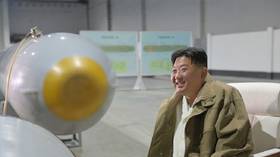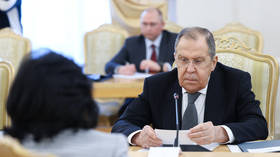Is war coming to the Korean peninsula?
 Timur Fomenko, RT, January 23, 2024 —
Timur Fomenko, RT, January 23, 2024 —
With nothing to lose and limited time to achieve certain geopolitical goals, Kim Jong-un might opt for conflict as his only option.
A few days ago an analysis piece appeared on the North Korea research website 38North with the headline asking the question: “Is Kim Jong un preparing for war?”
38North is a respected source of analysis and does not push an agenda or sensationalism. This particular piece was authored by Robert Carlin and Siegfried Hecker, who are also not known to be alarmist.
Their argument is as follows: North Korea has attempted to pursue a process of normalization with the US, particularly during the Donald Trump administration in 2018-2019, and failed after Trump walked out on the February 2019 meeting in Hanoi. After that effort failed, Pyongyang has now effectively “given up.” It believes it has no options left, and has continued developing its nuclear program and increasingly hardening its position, emboldened by the geopolitical context in respect to Russia and China.
It might be noted early on that this assessment does not give “hard” evidence of North Korea pursuing such a path, and relies only on changes in Pyongyang’s rhetoric to argue that the DPRK’s claims are not “bluster” but a true reflection of its strategic position. Many things have changed since 2019 that should be taken into consideration: the Biden administration has no interest in negotiating with North Korea, a hostile Presidency has came to power in Seoul under Yoon Suk-yeol, who is pro-Japan and has abandoned the reconciliatory approach of Moon Jae-in, while the US’ confrontation against both Russia and China has given the DPRK new options to try and subvert the isolation it experienced during the era of American unipolarity.
Because of this, the US has completely lost its ability to hold North Korea’s nuclear and ballistic missile programs to account, with new sanctions now being blocked at the UN by Moscow and Beijing, and existing ones not enforced. North Korea is increasingly capable of hitting the American homeland with ICBMs. This is also making unilateral, pre-emptive military action by the US against the DPRK an increasingly unrealistic prospect. But why would this enable Kim Jong-un to pursue a war of choice against South Korea and, should he start one, would he truly have a chance of winning it?
North Korea’s entire diplomatic strategy from the 1950s onwards has always been to exert maximum leverage for itself as a small country, by creating crisis. This is the Juche ideology’s ultimate focus on independence and sovereignty at all costs, even to its own population. To this end, the DPRK has always been provocative, whether it be killing US soldiers with axes, capturing the US spy ship USS Pueblo, shelling South Korean islands indiscriminately or even sinking a South Korean warship during an exercise. In doing so it aims to force the hands of not only its enemies but also of those who are friendly to it.
Recognizing its critical strategic position, Pyongyang has absolutely no problem dragging Moscow and Beijing into a crisis whether they like it or not, and was happy to cause significant trouble during the Sino-Soviet split. Therefore, in an era when China and Russia are both in a state of tensions –even confrontation– with the US, North Korea ultimately calculates opportunity for itself and extended leverage. Kim Jong-un will recognize that neither state in such a geopolitical situation could tolerate the fall of his regime and the reunification of the Korean peninsula on US-centric terms, which, for China, places an American military presence right next to its own border.
Indeed, even though Kim Il-sung started the Korean war in 1950 and subsequently faced defeat from the US and its allies, China still saved him – and back then it was much weaker than it is now. So, would Kim Jong-un fancy his chances in unleashing a full-scale war again on the Korean peninsula on the premise China would be forced to intervene? That isn’t beyond the realm of possibility. Does Kim want the US and China to normalize and improve ties? Of course not, because it means they will cooperate against him to force him to denuclearize. As for the benefits of such a reconciliation for the global economy – why would Kim care about that when his country is impoverished and isolated from said global economy anyway?
So where does this leave the DPRK? It leaves Kim Jong-un with a window of time to achieve a series of geopolitical objectives and goals, in a context which is favorable to him, and therein raises the prospect of a serious escalation of tensions in some way. We’ve already seen how similar considerations led to a full-scale war, or two now, in the Middle East. We can’t determine whether they will lead to the outbreak of a conflict on the Korean peninsula, but it would be foolish to rule out the possibility, given the world we live in today.
Multipolarity has arrived and it heralds the collapse of the US-centric, unipolar order which imposed stability by force as a one-way street. Many obviously assume the DPRK’s Soviet-era military could be destroyed by overwhelming US and allied power in the same way Saddam Hussein’s was in 1991 and 2003, but that was a different world. Here, you have a nuclear capable DPRK that has overseas backers who, while never wanting such a conflict, can’t afford to see the state fail. North Korea has made attempts at peace but met with America’s absolute unwillingness to compromise – therefore, what options does Kim have left to deal with South Korea?
*
Timur Fomenko, political analyst.


